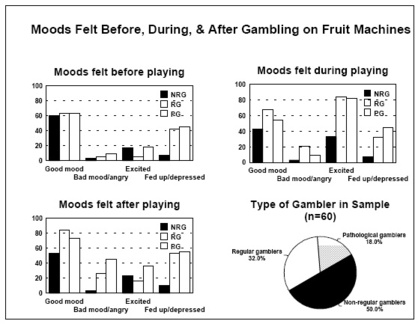The factors important to the initiation of gambling activity may be different from the factors responsible for maintaining gambling behavior over time. Research into the maintenance of fruit machine (slot machine) gambling in the U.K. has examined the role of 1) excitement and 2) depression as gambling reinforcers. With a convenience sample of 60 subjects, a U.K. study* had each subject gamble on a particular fruit machine at a local amusement arcade. The mean age of the sample was 23.4; 73.3% of the subjects were male. Pathological gamblers (PG) were defined as those meeting DSM-III-R criteria; regular gamblers (RG) were those who gambled on fruit machines at least once a week, and non-regular gamblers (NRG) gambled on fruit machines once a month or less. In an interview conducted after the experiment, subjects reported on their moods before, during, and after gambling. Respondents could report experiencing more than one mood at any one time. Generally, most players reported good moods before, during, and after playing fruit machines. Both pathological and regular players were significantly more likely to report being fed up or depressed than non-regular players before playing. During play, pathological gamblers and regular players were significantly more likely to be excited than non-regular players. After playing, pathological gamblers were significantly more likely to be in a bad mood, angry, fed up or depressed than non-regular players. In this study, gambling offered more excitement to those who played regularly (including pathological gamblers); this excitement could reinforce the continuation of gambling. Griffiths speculates that what differentiates those who continue to play regularly from those who continue to play and develop problems is that the latter group might develop tolerance and need to gamble more to experience the same level of excitement. This study also supports the association between pathological gambling and depression; however, while pathological gamblers may be more depressed even before they gamble, gambling doesn’t relieve their depression.
Source: *Griffiths, M. (1995). Adolescent gambling. London: Routledge.
This public education project is funded, in part, by The Andrews Foundation.





